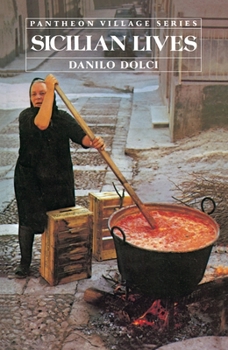Sicilian Lives
Select Format
Select Condition 
Book Overview
When Danilo Docli, peace worker, organizer, educator, first arrived in 1952 in Trappeto, a village of peasants and fishermen in western Sicily, there were no streets, just mud and dust, not a single drugstore, not even a sewer. (In fact, the local dialect didn't even have a word for sewer.) Like other Sicilians, the villagers, seen by many Italians as "bandits," "dirt-eaters," and "savages," had, in effect, been mute for centuries. Dolci's years of...
Format:Paperback
Language:English
ISBN:0394749383
ISBN13:9780394749389
Release Date:December 1981
Publisher:Pantheon Books
Length:336 Pages
Weight:0.90 lbs.
Dimensions:0.8" x 5.5" x 8.5"
Customer Reviews
0 rating





